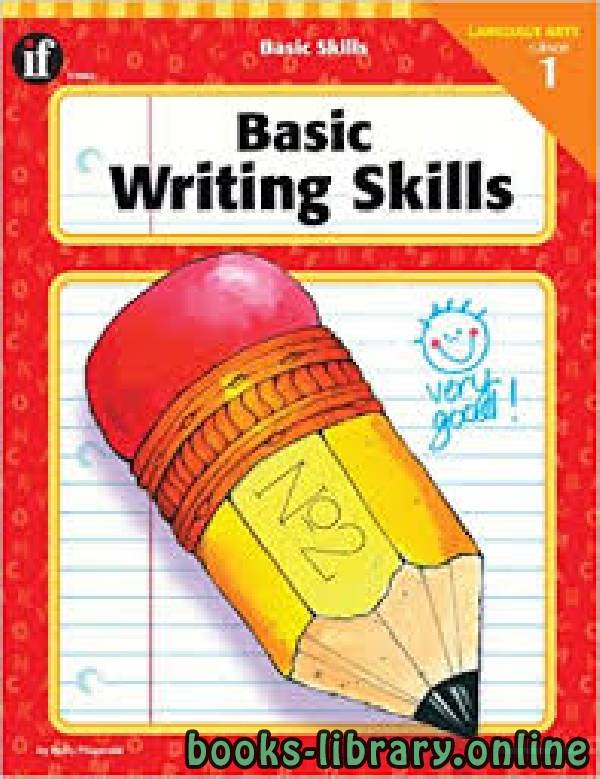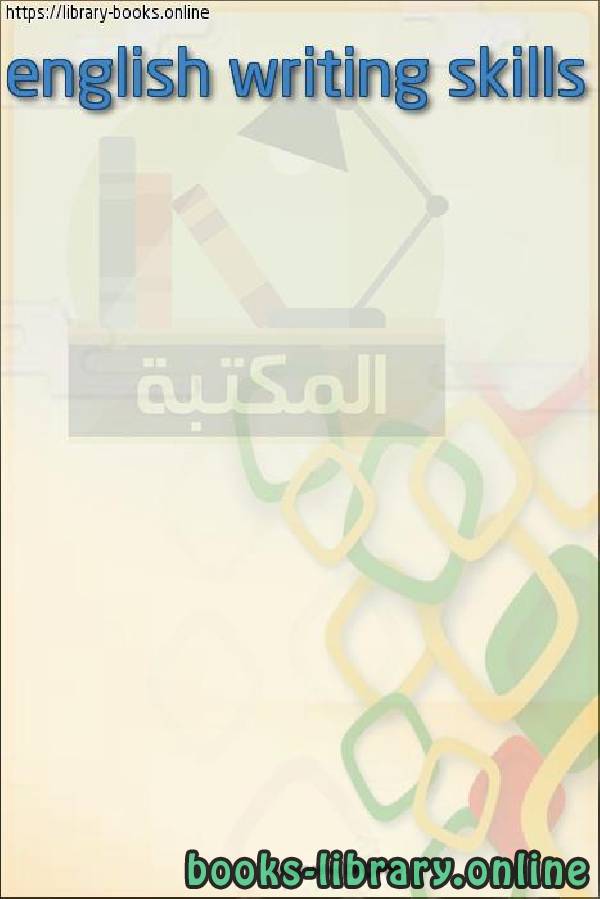كتاب Five Elements of Good Writing
Five Elements of Good Writing Element 1: Purpose When we talk about the purpose of a paragraph, we are talking about the reasons that a writer is writing a particular paragraph. For writers to stay focused on their topic, they must understand the purpose that they are trying to accomplish. The purpose is the goal the writer is trying to achieve. The three most common goals of academic writing are: • to inform the readers • to persuade the readers • to entertain the readers The second element of good writing is to keep your audience in mind as you write. The term audience refers to the readers. Good writers know who their audience is before they start writing. Good writers keep their audience in mind as they write every sentence in their paragraph. Relating to Your Audience Consider these two main elements in relating to your audience: • viewpoint or person (first, second, or third) • formal or informal writingكاتب غير معروف - يشمل يركن (كاتب غير معروف) كل الكتب التي لا يعرف مؤلفيها، حيث أن العمل في شيء بالشكل المجهول هو التدخل بشكل شخصي دون استخدام اسم محدد أو التعريف عن الهوية، وتشير حالة "غير معروف" أو "المجهول" عادة إلى حالة شخص ما بدون معرفة عامة لشخصيته أو لمعلومات تحدد هويته. هناك العديد من الأسباب التي يختار من أجلها شخص ما إخفاء شخصيته أو أن يصبح مجهولا. يكون بعض تلك الأسباب قانونيا أو اجتماعيا، مثل إجراء الأعمال الخيرية أو دفع التبرعات بشكل مجهول، حيث يرغب بعض من المتبرعين بعدم الإشارة إلى تبرعاتهم بأي شكل يرتبط بشخصهم. كما أن من يتعرض أو قد يتعرض للتهديد من قبل طرف ما يميل إلى إخفاء هويته، مثل الشهود في محاكمات الجرائم، أو الاتصال بشكل مجهول بالسلطات للإدلاء بمعلومات تفيد مسار التحقيق في القضايا العالقة. كما أن المجرمين بشكل عام يحاولون إبقاء أنفسهم مجهولي الهوية سواء من أجل منع إشهار حقيقة ارتكابهم للجريمة أو لتجنب القبض عليهم.
من الكتابة Writing كتب تعلم اللغة الإنجليزية - مكتبة كتب تعلم اللغات.

قراءة كتاب Five Elements of Good Writing أونلاين
معلومات عن كتاب Five Elements of Good Writing:
Element 1: Purpose
When we talk about the purpose of a paragraph, we are talking about the reasons that a writer
is writing a particular paragraph. For writers to stay focused on their topic, they must understand the
purpose that they are trying to accomplish. The purpose is the goal the writer is trying to achieve.
The three most common goals of academic writing are:
• to inform the readers
• to persuade the readers
• to entertain the readers
The second element of good writing is to keep your audience in mind as you write. The term
audience refers to the readers. Good writers know who their audience is before they start writing. Good
writers keep their audience in mind as they write every sentence in their paragraph.
Relating to Your Audience
Consider these two main elements in relating to your audience:
• viewpoint or person (first, second, or third)
• formal or informal writing
سنة النشر : 2015م / 1436هـ .
عدد مرات التحميل : 6221 مرّة / مرات.
تم اضافته في : الثلاثاء , 31 ديسمبر 2019م.
حجم الكتاب عند التحميل : 4.4MB .
تعليقات ومناقشات حول الكتاب:
هذا القسم يهتم بالكتابة باللغة الإنجليزية .
الكتابة تُمثّل لُغة نصية عبر استخدام رسومات رمزية (حروف)، ويمكن بها توثيق النطق ونقل الفكَر والأحداث إلى رموز يمكن قراءتها حسب نموذج مخصص لكل لغة. وبدأ الإنسان الكتابة عن طريق الرسم ثم تطورت هذه الرموز إلى أحرف لكي تختصر وقت الكتابة.
ولقد بدأ الإنسان الكتابة مستخدما الوسائل المتاحة لديه حيث بدأ باستخدام النقش على الحجر لتدوين ما يريده ثم انتقل إلى الكتابة على أوعية أخرى كالرق والبردي والورق الذي اخترع في بداية القرن الثاني الميلادي. ثم ما لبث الإنسان الأكثر تقدما أن اخترع الآلات التي تساعده على الكتابة مثل الآلات الكاتبة والمطابع، وأخيرا أصبح الإنسان يستخدم الكتابة من خلال أجهزة متقدمة مثل الحواسيب، وأصبح يتعامل اليوم بما يسمى الكتب الإلكترونية.
Writing is a medium of human communication that represents language with signs and symbols. For languages that utilize a writing system, inscriptions can complement spoken language by creating a durable version of speech that can be stored for future reference or transmitted across distance. Writing, in other words, is not a language, but a tool used to make languages readable.[1] Within a language system, writing relies on many of the same structures as speech, such as vocabulary, grammar, and semantics, with the added dependency of a system of signs or symbols. The result of the activity of writing is called a text, and the interpreter or activator of this text is called a reader.
H.G. Wells argued that writing has the ability to "put agreements, laws, commandments on record. It made the growth of states larger than the old city states possible. It made a continuous historical consciousness possible. The command of the priest or king and his seal could go far beyond his sight and voice and could survive his death".[3] As human societies emerged, collective motivations for the development of writing were driven by pragmatic exigencies like keeping history, maintaining culture, codifying knowledge through curricula and lists of texts deemed to contain foundational knowledge (e.g., The Canon of Medicine) or artistically exceptional (e.g., a literary canon), organizing and governing societies through the formation of legal systems, census records, contracts, deeds of ownership, taxation, trade agreements, treaties, and so on. For example, around the 4th millennium BC, the complexity of trade and administration in Mesopotamia outgrew human memory, and writing became a more dependable method of recording and presenting transactions in a permanent form.[4] In both ancient Egypt and Mesoamerica, on the other hand, writing may have evolved through calendric and political necessities for recording historical and environmental events.
Individual motivations for writing include improvised additional capacity for the limitations of human memory (e.g., to-do lists, recipes, reminders, logbooks, maps, the proper sequence for a complicated task or important ritual), dissemination of ideas (as in an essay, monograph, broadside, petition, or manifesto), imaginative narratives and other forms of storytelling, personal or business correspondence, and lifewriting (e.g., a diary or journal).
Contents
1 Writing systems
1.1 Logographies
1.2 Syllabaries
1.3 Alphabets
1.3.1 Abjads
1.3.2 Abugidas
1.4 Featural scripts
1.5 Historical significance of writing systems
1.6 Tools and materials
2 History
2.1 Mesopotamia
2.2 Egypt
2.3 Elamite scripts
2.3.1 Cretan and Greek scripts
2.4 China
2.5 Indus Valley
2.6 Central Asia
2.7 Phoenician writing system and descendants
2.8 Mesoamerica
2.9 South America
Five Elements of Good Writing
Element 1: Purpose
When we talk about the purpose of a paragraph, we are talking about the reasons that a writer
is writing a particular paragraph. For writers to stay focused on their topic, they must understand the
purpose that they are trying to accomplish. The purpose is the goal the writer is trying to achieve.
The three most common goals of academic writing are:
• to inform the readers
• to persuade the readers
• to entertain the readers
The second element of good writing is to keep your audience in mind as you write. The term
audience refers to the readers. Good writers know who their audience is before they start writing. Good
writers keep their audience in mind as they write every sentence in their paragraph.
Relating to Your Audience
Consider these two main elements in relating to your audience:
• viewpoint or person (first, second, or third)
• formal or informal writing
writing english
writing skills
writing paragraph
writing translation
writing a story
writing skills pdf
writing email
writing skill
definition of writing
 مهلاً !
مهلاً !قبل تحميل الكتاب .. يجب ان يتوفر لديكم برنامج تشغيل وقراءة ملفات pdf
يمكن تحميلة من هنا 'تحميل البرنامج'

نوع الكتاب : pdf.
اذا اعجبك الكتاب فضلاً اضغط على أعجبني و يمكنك تحميله من هنا:


كتب اخرى في الكتابة Writing

How to Write an Essay: 10 Easy Steps PDF
قراءة و تحميل كتاب How to Write an Essay: 10 Easy Steps PDF مجانا

Developing your academic writing skills: a handbook PDF
قراءة و تحميل كتاب Developing your academic writing skills: a handbook PDF مجانا








